BLB2125 Real Property Law Assignment - Contemporary Issues
VerifiedAdded on 2022/12/21
|8
|1774
|67
Report
AI Summary
This assignment delves into key aspects of property law, addressing three critical questions. The first question explores the distinctions between past, intermediate period, and future acts within the Native Title Act regime. The second question provides a comprehensive discussion of indefeasibility of title under the Torrens system, including the registration process, legal outcomes, consequences of registration, and exceptions to indefeasibility. The third question presents a hypothetical scenario involving a property dispute between Mr. Black and Mr. Green, analyzing the legal implications of equitable interests and relevant statutory provisions to determine the outcome of the dispute.
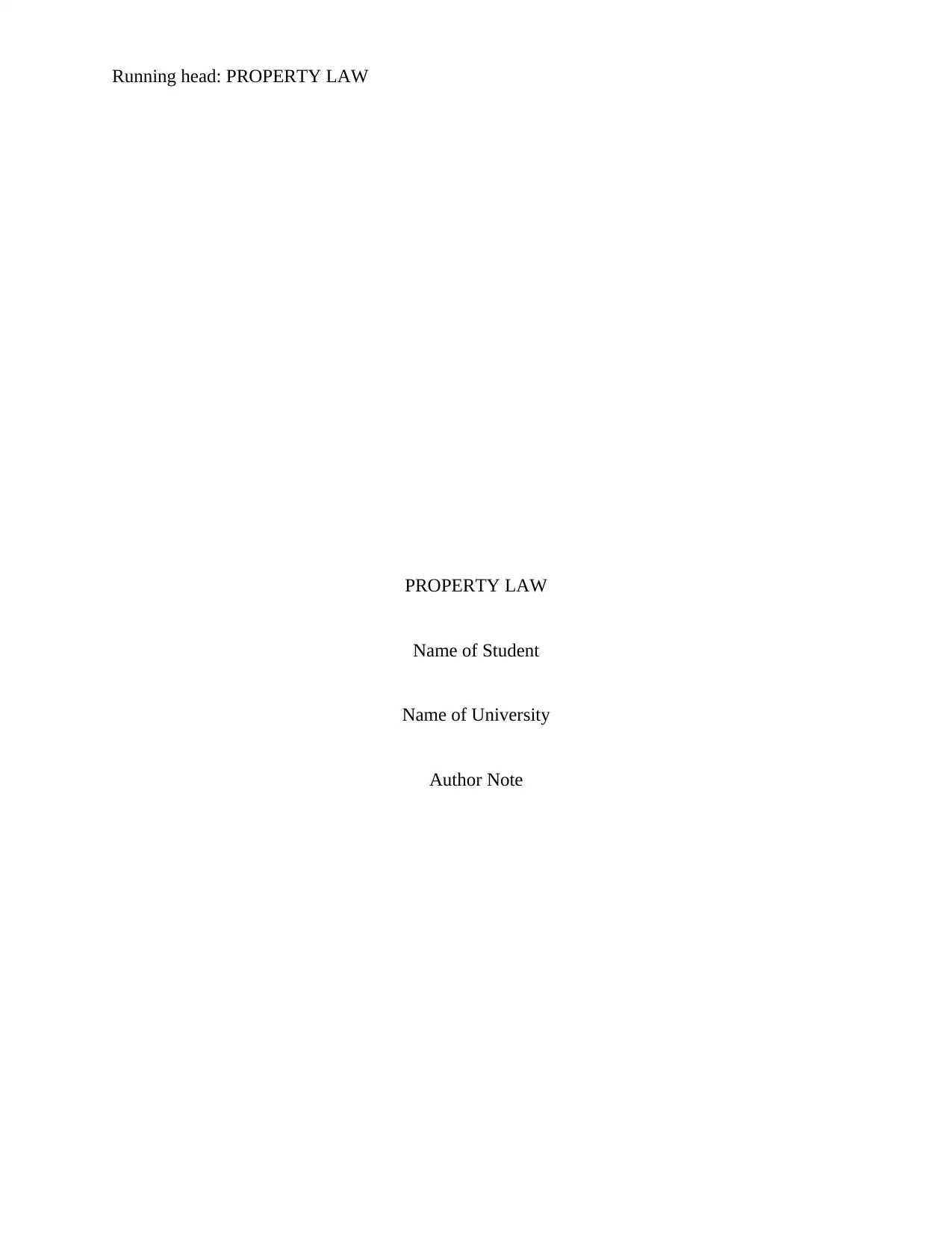
Running head: PROPERTY LAW
PROPERTY LAW
Name of Student
Name of University
Author Note
PROPERTY LAW
Name of Student
Name of University
Author Note
Paraphrase This Document
Need a fresh take? Get an instant paraphrase of this document with our AI Paraphraser
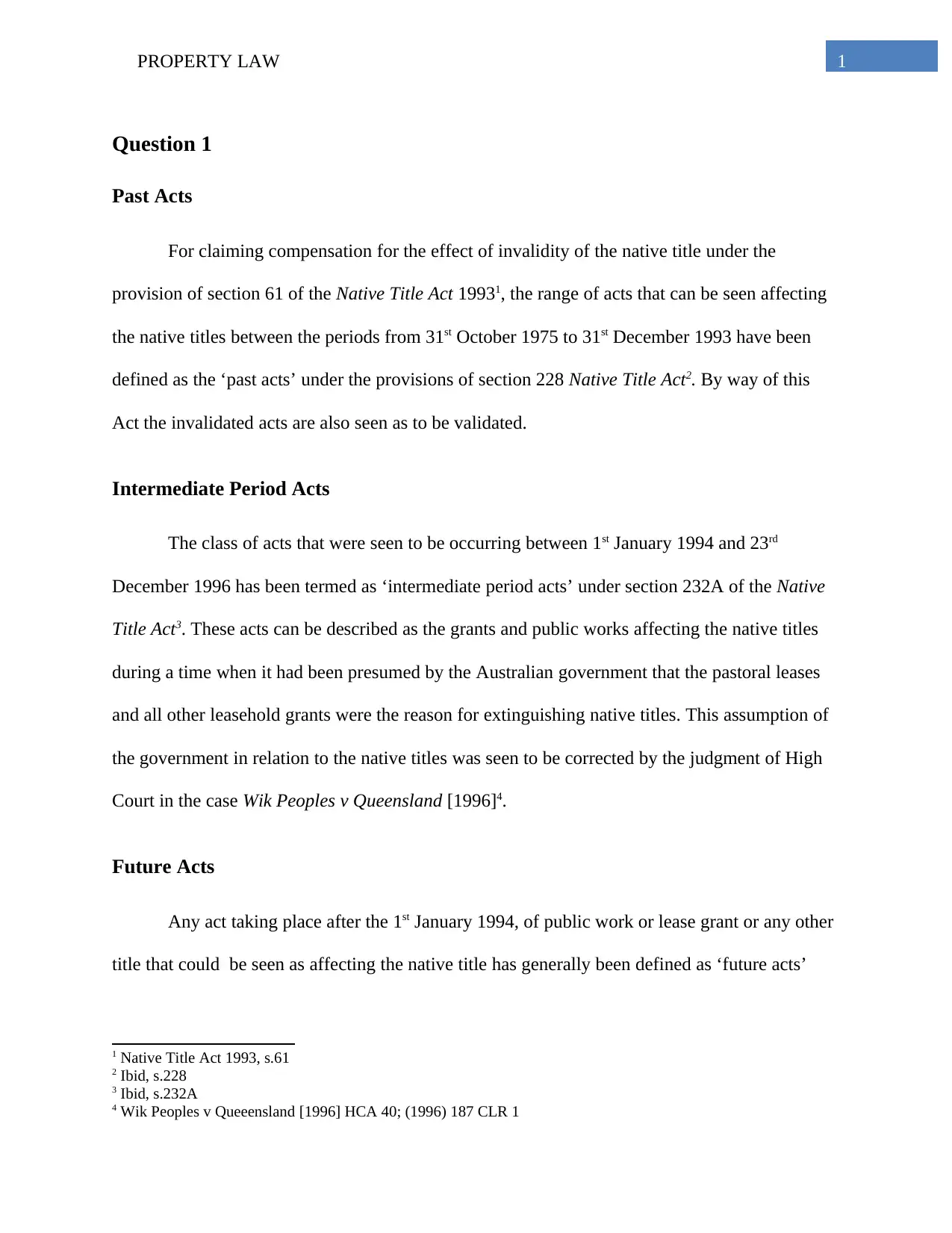
1PROPERTY LAW
Question 1
Past Acts
For claiming compensation for the effect of invalidity of the native title under the
provision of section 61 of the Native Title Act 19931, the range of acts that can be seen affecting
the native titles between the periods from 31st October 1975 to 31st December 1993 have been
defined as the ‘past acts’ under the provisions of section 228 Native Title Act2. By way of this
Act the invalidated acts are also seen as to be validated.
Intermediate Period Acts
The class of acts that were seen to be occurring between 1st January 1994 and 23rd
December 1996 has been termed as ‘intermediate period acts’ under section 232A of the Native
Title Act3. These acts can be described as the grants and public works affecting the native titles
during a time when it had been presumed by the Australian government that the pastoral leases
and all other leasehold grants were the reason for extinguishing native titles. This assumption of
the government in relation to the native titles was seen to be corrected by the judgment of High
Court in the case Wik Peoples v Queensland [1996]4.
Future Acts
Any act taking place after the 1st January 1994, of public work or lease grant or any other
title that could be seen as affecting the native title has generally been defined as ‘future acts’
1 Native Title Act 1993, s.61
2 Ibid, s.228
3 Ibid, s.232A
4 Wik Peoples v Queeensland [1996] HCA 40; (1996) 187 CLR 1
Question 1
Past Acts
For claiming compensation for the effect of invalidity of the native title under the
provision of section 61 of the Native Title Act 19931, the range of acts that can be seen affecting
the native titles between the periods from 31st October 1975 to 31st December 1993 have been
defined as the ‘past acts’ under the provisions of section 228 Native Title Act2. By way of this
Act the invalidated acts are also seen as to be validated.
Intermediate Period Acts
The class of acts that were seen to be occurring between 1st January 1994 and 23rd
December 1996 has been termed as ‘intermediate period acts’ under section 232A of the Native
Title Act3. These acts can be described as the grants and public works affecting the native titles
during a time when it had been presumed by the Australian government that the pastoral leases
and all other leasehold grants were the reason for extinguishing native titles. This assumption of
the government in relation to the native titles was seen to be corrected by the judgment of High
Court in the case Wik Peoples v Queensland [1996]4.
Future Acts
Any act taking place after the 1st January 1994, of public work or lease grant or any other
title that could be seen as affecting the native title has generally been defined as ‘future acts’
1 Native Title Act 1993, s.61
2 Ibid, s.228
3 Ibid, s.232A
4 Wik Peoples v Queeensland [1996] HCA 40; (1996) 187 CLR 1
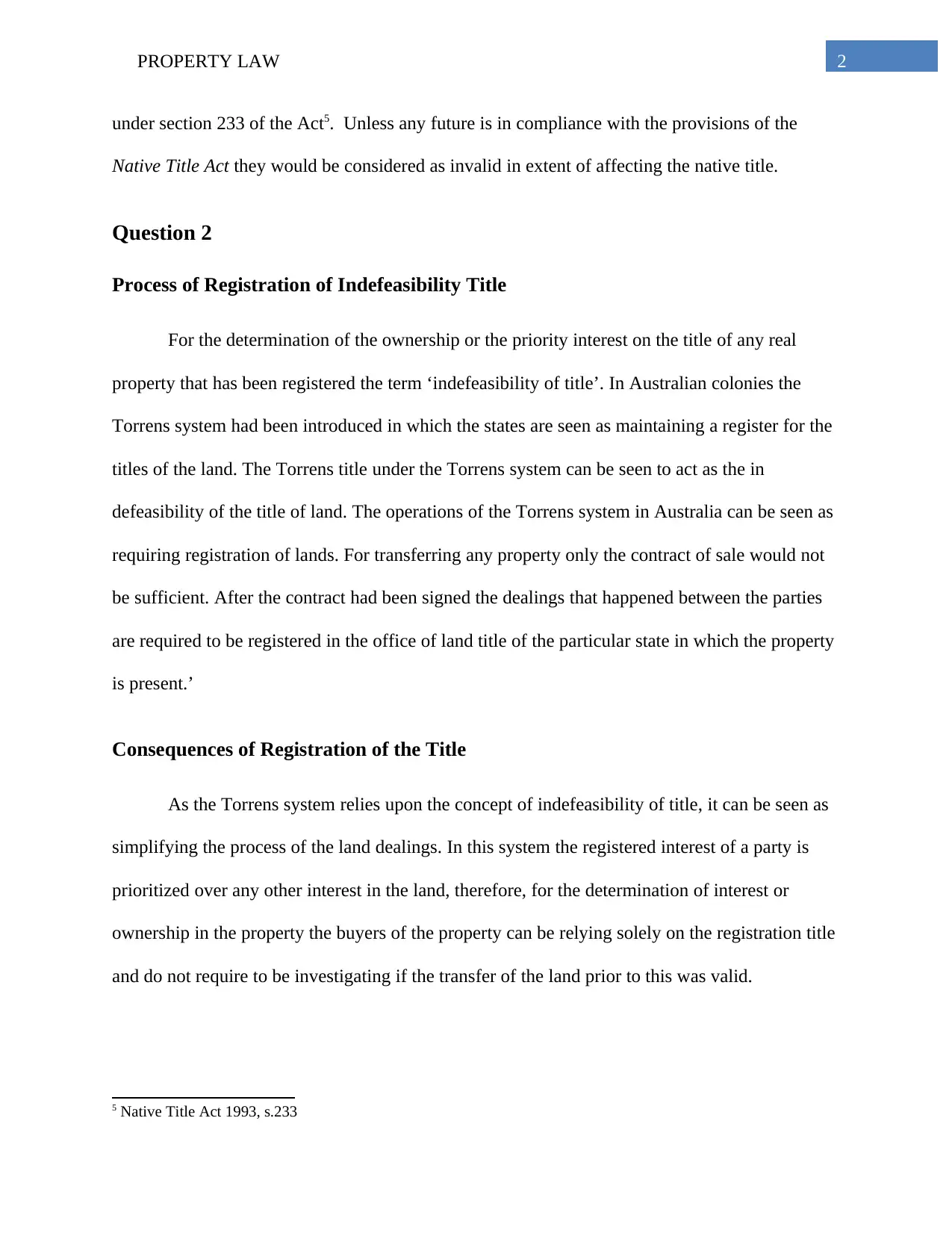
2PROPERTY LAW
under section 233 of the Act5. Unless any future is in compliance with the provisions of the
Native Title Act they would be considered as invalid in extent of affecting the native title.
Question 2
Process of Registration of Indefeasibility Title
For the determination of the ownership or the priority interest on the title of any real
property that has been registered the term ‘indefeasibility of title’. In Australian colonies the
Torrens system had been introduced in which the states are seen as maintaining a register for the
titles of the land. The Torrens title under the Torrens system can be seen to act as the in
defeasibility of the title of land. The operations of the Torrens system in Australia can be seen as
requiring registration of lands. For transferring any property only the contract of sale would not
be sufficient. After the contract had been signed the dealings that happened between the parties
are required to be registered in the office of land title of the particular state in which the property
is present.’
Consequences of Registration of the Title
As the Torrens system relies upon the concept of indefeasibility of title, it can be seen as
simplifying the process of the land dealings. In this system the registered interest of a party is
prioritized over any other interest in the land, therefore, for the determination of interest or
ownership in the property the buyers of the property can be relying solely on the registration title
and do not require to be investigating if the transfer of the land prior to this was valid.
5 Native Title Act 1993, s.233
under section 233 of the Act5. Unless any future is in compliance with the provisions of the
Native Title Act they would be considered as invalid in extent of affecting the native title.
Question 2
Process of Registration of Indefeasibility Title
For the determination of the ownership or the priority interest on the title of any real
property that has been registered the term ‘indefeasibility of title’. In Australian colonies the
Torrens system had been introduced in which the states are seen as maintaining a register for the
titles of the land. The Torrens title under the Torrens system can be seen to act as the in
defeasibility of the title of land. The operations of the Torrens system in Australia can be seen as
requiring registration of lands. For transferring any property only the contract of sale would not
be sufficient. After the contract had been signed the dealings that happened between the parties
are required to be registered in the office of land title of the particular state in which the property
is present.’
Consequences of Registration of the Title
As the Torrens system relies upon the concept of indefeasibility of title, it can be seen as
simplifying the process of the land dealings. In this system the registered interest of a party is
prioritized over any other interest in the land, therefore, for the determination of interest or
ownership in the property the buyers of the property can be relying solely on the registration title
and do not require to be investigating if the transfer of the land prior to this was valid.
5 Native Title Act 1993, s.233
⊘ This is a preview!⊘
Do you want full access?
Subscribe today to unlock all pages.

Trusted by 1+ million students worldwide
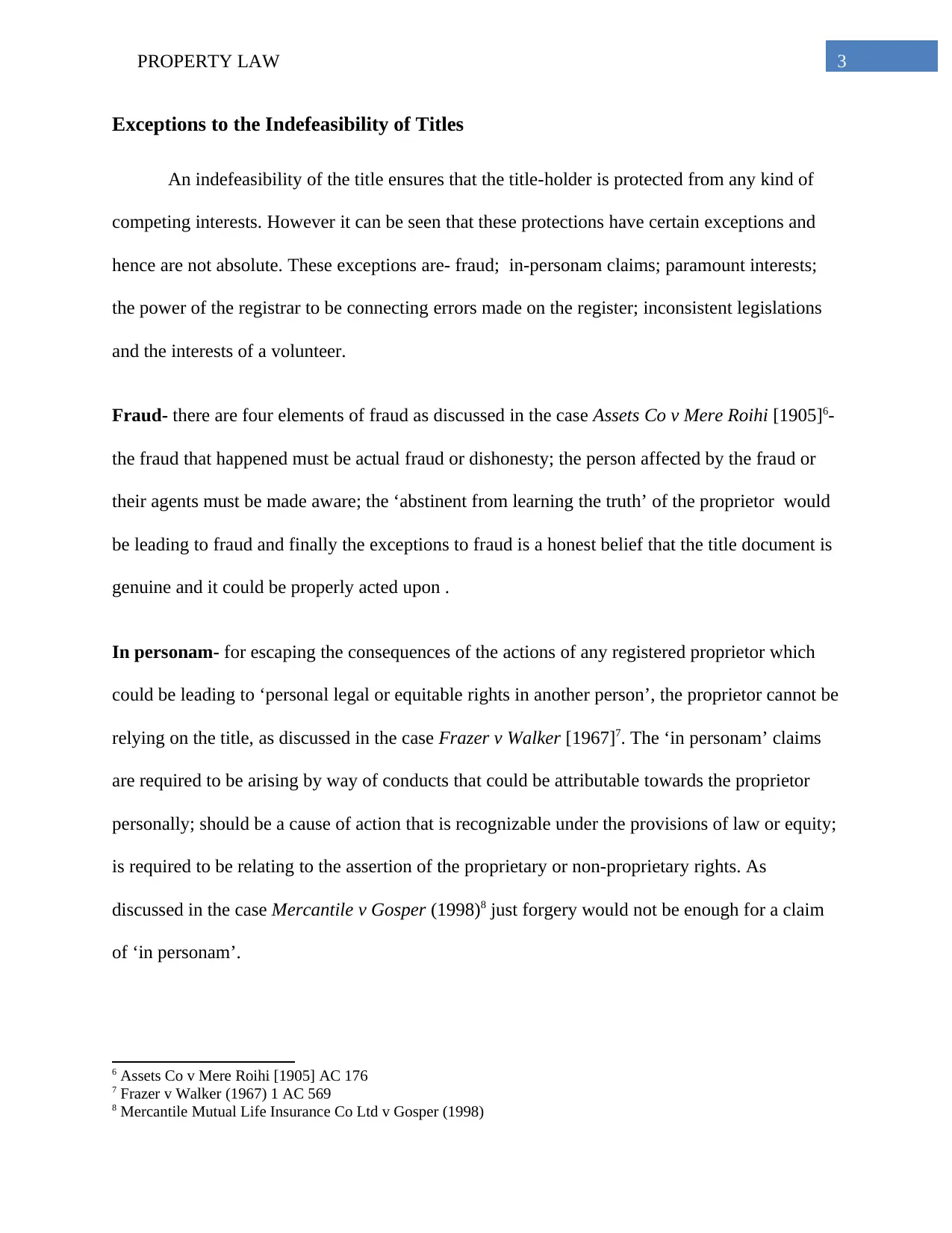
3PROPERTY LAW
Exceptions to the Indefeasibility of Titles
An indefeasibility of the title ensures that the title-holder is protected from any kind of
competing interests. However it can be seen that these protections have certain exceptions and
hence are not absolute. These exceptions are- fraud; in-personam claims; paramount interests;
the power of the registrar to be connecting errors made on the register; inconsistent legislations
and the interests of a volunteer.
Fraud- there are four elements of fraud as discussed in the case Assets Co v Mere Roihi [1905]6-
the fraud that happened must be actual fraud or dishonesty; the person affected by the fraud or
their agents must be made aware; the ‘abstinent from learning the truth’ of the proprietor would
be leading to fraud and finally the exceptions to fraud is a honest belief that the title document is
genuine and it could be properly acted upon .
In personam- for escaping the consequences of the actions of any registered proprietor which
could be leading to ‘personal legal or equitable rights in another person’, the proprietor cannot be
relying on the title, as discussed in the case Frazer v Walker [1967]7. The ‘in personam’ claims
are required to be arising by way of conducts that could be attributable towards the proprietor
personally; should be a cause of action that is recognizable under the provisions of law or equity;
is required to be relating to the assertion of the proprietary or non-proprietary rights. As
discussed in the case Mercantile v Gosper (1998)8 just forgery would not be enough for a claim
of ‘in personam’.
6 Assets Co v Mere Roihi [1905] AC 176
7 Frazer v Walker (1967) 1 AC 569
8 Mercantile Mutual Life Insurance Co Ltd v Gosper (1998)
Exceptions to the Indefeasibility of Titles
An indefeasibility of the title ensures that the title-holder is protected from any kind of
competing interests. However it can be seen that these protections have certain exceptions and
hence are not absolute. These exceptions are- fraud; in-personam claims; paramount interests;
the power of the registrar to be connecting errors made on the register; inconsistent legislations
and the interests of a volunteer.
Fraud- there are four elements of fraud as discussed in the case Assets Co v Mere Roihi [1905]6-
the fraud that happened must be actual fraud or dishonesty; the person affected by the fraud or
their agents must be made aware; the ‘abstinent from learning the truth’ of the proprietor would
be leading to fraud and finally the exceptions to fraud is a honest belief that the title document is
genuine and it could be properly acted upon .
In personam- for escaping the consequences of the actions of any registered proprietor which
could be leading to ‘personal legal or equitable rights in another person’, the proprietor cannot be
relying on the title, as discussed in the case Frazer v Walker [1967]7. The ‘in personam’ claims
are required to be arising by way of conducts that could be attributable towards the proprietor
personally; should be a cause of action that is recognizable under the provisions of law or equity;
is required to be relating to the assertion of the proprietary or non-proprietary rights. As
discussed in the case Mercantile v Gosper (1998)8 just forgery would not be enough for a claim
of ‘in personam’.
6 Assets Co v Mere Roihi [1905] AC 176
7 Frazer v Walker (1967) 1 AC 569
8 Mercantile Mutual Life Insurance Co Ltd v Gosper (1998)
Paraphrase This Document
Need a fresh take? Get an instant paraphrase of this document with our AI Paraphraser
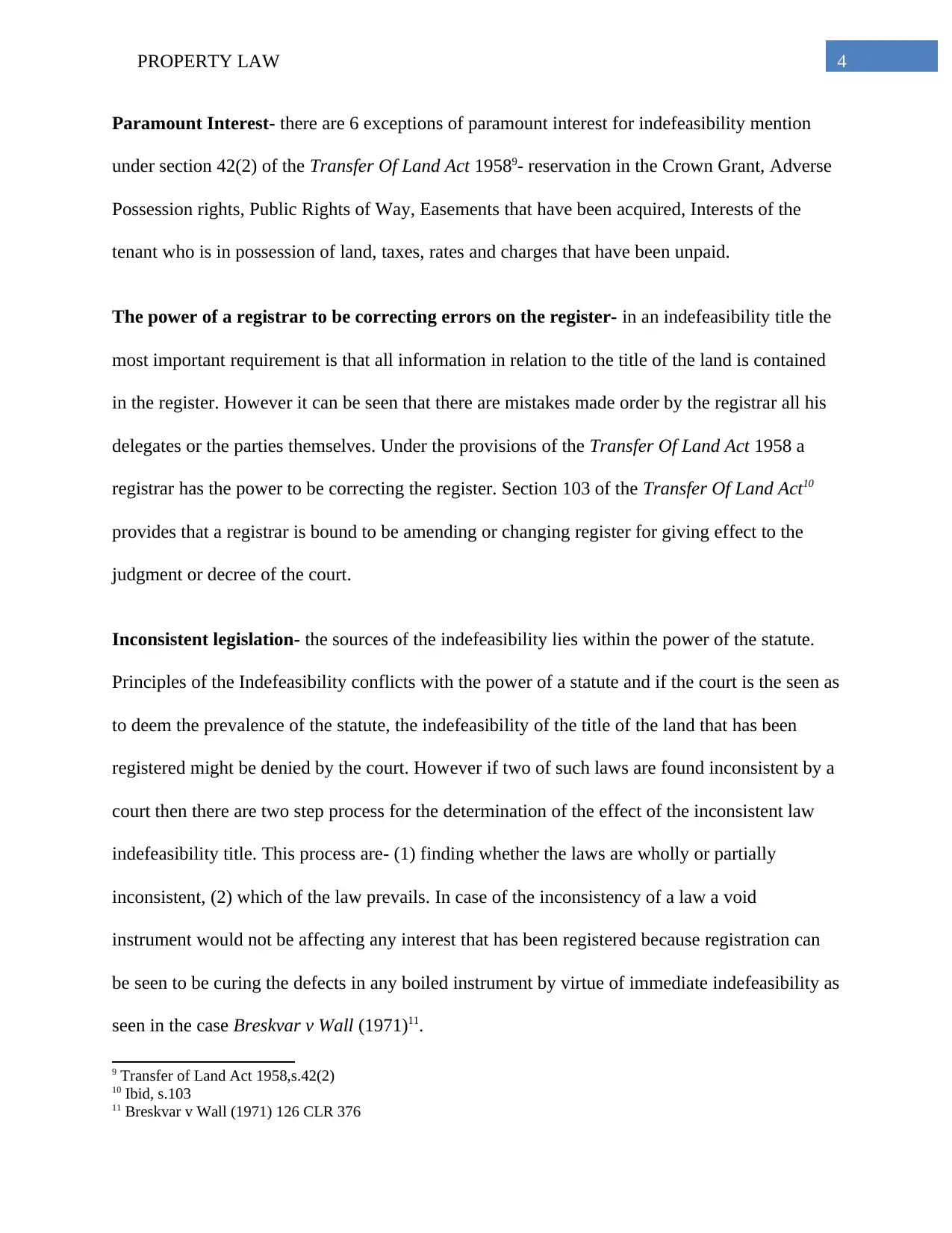
4PROPERTY LAW
Paramount Interest- there are 6 exceptions of paramount interest for indefeasibility mention
under section 42(2) of the Transfer Of Land Act 19589- reservation in the Crown Grant, Adverse
Possession rights, Public Rights of Way, Easements that have been acquired, Interests of the
tenant who is in possession of land, taxes, rates and charges that have been unpaid.
The power of a registrar to be correcting errors on the register- in an indefeasibility title the
most important requirement is that all information in relation to the title of the land is contained
in the register. However it can be seen that there are mistakes made order by the registrar all his
delegates or the parties themselves. Under the provisions of the Transfer Of Land Act 1958 a
registrar has the power to be correcting the register. Section 103 of the Transfer Of Land Act10
provides that a registrar is bound to be amending or changing register for giving effect to the
judgment or decree of the court.
Inconsistent legislation- the sources of the indefeasibility lies within the power of the statute.
Principles of the Indefeasibility conflicts with the power of a statute and if the court is the seen as
to deem the prevalence of the statute, the indefeasibility of the title of the land that has been
registered might be denied by the court. However if two of such laws are found inconsistent by a
court then there are two step process for the determination of the effect of the inconsistent law
indefeasibility title. This process are- (1) finding whether the laws are wholly or partially
inconsistent, (2) which of the law prevails. In case of the inconsistency of a law a void
instrument would not be affecting any interest that has been registered because registration can
be seen to be curing the defects in any boiled instrument by virtue of immediate indefeasibility as
seen in the case Breskvar v Wall (1971)11.
9 Transfer of Land Act 1958,s.42(2)
10 Ibid, s.103
11 Breskvar v Wall (1971) 126 CLR 376
Paramount Interest- there are 6 exceptions of paramount interest for indefeasibility mention
under section 42(2) of the Transfer Of Land Act 19589- reservation in the Crown Grant, Adverse
Possession rights, Public Rights of Way, Easements that have been acquired, Interests of the
tenant who is in possession of land, taxes, rates and charges that have been unpaid.
The power of a registrar to be correcting errors on the register- in an indefeasibility title the
most important requirement is that all information in relation to the title of the land is contained
in the register. However it can be seen that there are mistakes made order by the registrar all his
delegates or the parties themselves. Under the provisions of the Transfer Of Land Act 1958 a
registrar has the power to be correcting the register. Section 103 of the Transfer Of Land Act10
provides that a registrar is bound to be amending or changing register for giving effect to the
judgment or decree of the court.
Inconsistent legislation- the sources of the indefeasibility lies within the power of the statute.
Principles of the Indefeasibility conflicts with the power of a statute and if the court is the seen as
to deem the prevalence of the statute, the indefeasibility of the title of the land that has been
registered might be denied by the court. However if two of such laws are found inconsistent by a
court then there are two step process for the determination of the effect of the inconsistent law
indefeasibility title. This process are- (1) finding whether the laws are wholly or partially
inconsistent, (2) which of the law prevails. In case of the inconsistency of a law a void
instrument would not be affecting any interest that has been registered because registration can
be seen to be curing the defects in any boiled instrument by virtue of immediate indefeasibility as
seen in the case Breskvar v Wall (1971)11.
9 Transfer of Land Act 1958,s.42(2)
10 Ibid, s.103
11 Breskvar v Wall (1971) 126 CLR 376
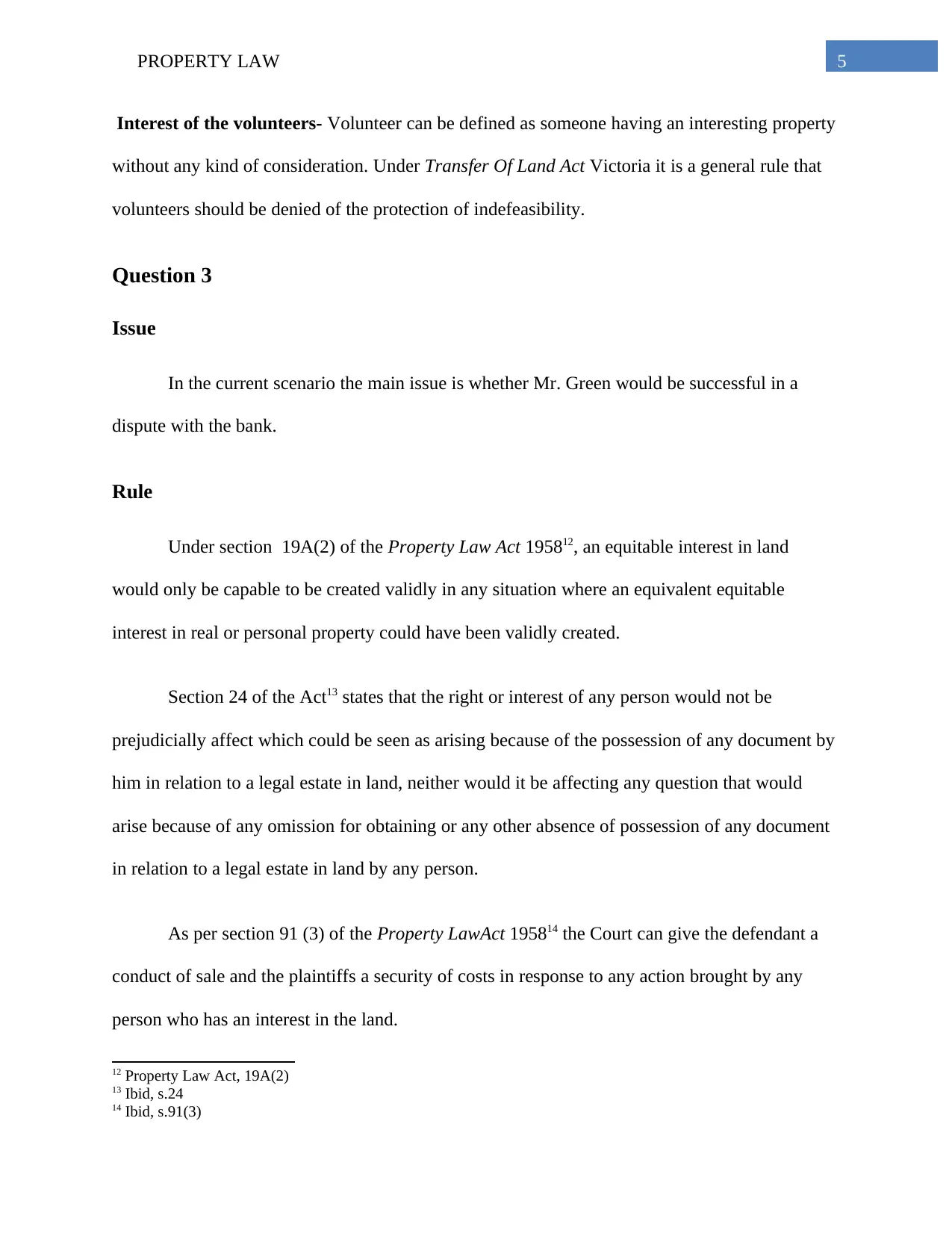
5PROPERTY LAW
Interest of the volunteers- Volunteer can be defined as someone having an interesting property
without any kind of consideration. Under Transfer Of Land Act Victoria it is a general rule that
volunteers should be denied of the protection of indefeasibility.
Question 3
Issue
In the current scenario the main issue is whether Mr. Green would be successful in a
dispute with the bank.
Rule
Under section 19A(2) of the Property Law Act 195812, an equitable interest in land
would only be capable to be created validly in any situation where an equivalent equitable
interest in real or personal property could have been validly created.
Section 24 of the Act13 states that the right or interest of any person would not be
prejudicially affect which could be seen as arising because of the possession of any document by
him in relation to a legal estate in land, neither would it be affecting any question that would
arise because of any omission for obtaining or any other absence of possession of any document
in relation to a legal estate in land by any person.
As per section 91 (3) of the Property LawAct 195814 the Court can give the defendant a
conduct of sale and the plaintiffs a security of costs in response to any action brought by any
person who has an interest in the land.
12 Property Law Act, 19A(2)
13 Ibid, s.24
14 Ibid, s.91(3)
Interest of the volunteers- Volunteer can be defined as someone having an interesting property
without any kind of consideration. Under Transfer Of Land Act Victoria it is a general rule that
volunteers should be denied of the protection of indefeasibility.
Question 3
Issue
In the current scenario the main issue is whether Mr. Green would be successful in a
dispute with the bank.
Rule
Under section 19A(2) of the Property Law Act 195812, an equitable interest in land
would only be capable to be created validly in any situation where an equivalent equitable
interest in real or personal property could have been validly created.
Section 24 of the Act13 states that the right or interest of any person would not be
prejudicially affect which could be seen as arising because of the possession of any document by
him in relation to a legal estate in land, neither would it be affecting any question that would
arise because of any omission for obtaining or any other absence of possession of any document
in relation to a legal estate in land by any person.
As per section 91 (3) of the Property LawAct 195814 the Court can give the defendant a
conduct of sale and the plaintiffs a security of costs in response to any action brought by any
person who has an interest in the land.
12 Property Law Act, 19A(2)
13 Ibid, s.24
14 Ibid, s.91(3)
⊘ This is a preview!⊘
Do you want full access?
Subscribe today to unlock all pages.

Trusted by 1+ million students worldwide
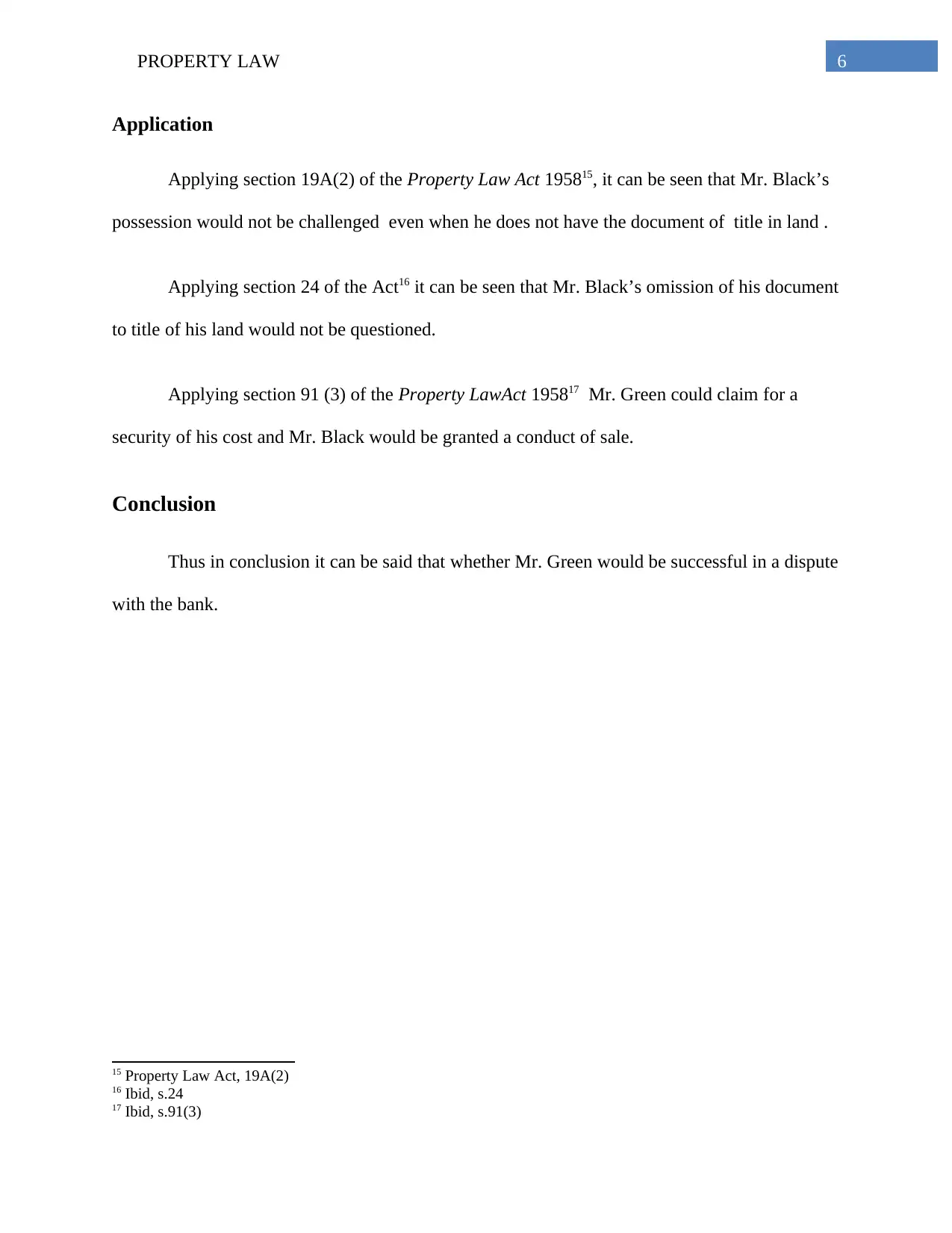
6PROPERTY LAW
Application
Applying section 19A(2) of the Property Law Act 195815, it can be seen that Mr. Black’s
possession would not be challenged even when he does not have the document of title in land .
Applying section 24 of the Act16 it can be seen that Mr. Black’s omission of his document
to title of his land would not be questioned.
Applying section 91 (3) of the Property LawAct 195817 Mr. Green could claim for a
security of his cost and Mr. Black would be granted a conduct of sale.
Conclusion
Thus in conclusion it can be said that whether Mr. Green would be successful in a dispute
with the bank.
15 Property Law Act, 19A(2)
16 Ibid, s.24
17 Ibid, s.91(3)
Application
Applying section 19A(2) of the Property Law Act 195815, it can be seen that Mr. Black’s
possession would not be challenged even when he does not have the document of title in land .
Applying section 24 of the Act16 it can be seen that Mr. Black’s omission of his document
to title of his land would not be questioned.
Applying section 91 (3) of the Property LawAct 195817 Mr. Green could claim for a
security of his cost and Mr. Black would be granted a conduct of sale.
Conclusion
Thus in conclusion it can be said that whether Mr. Green would be successful in a dispute
with the bank.
15 Property Law Act, 19A(2)
16 Ibid, s.24
17 Ibid, s.91(3)
Paraphrase This Document
Need a fresh take? Get an instant paraphrase of this document with our AI Paraphraser
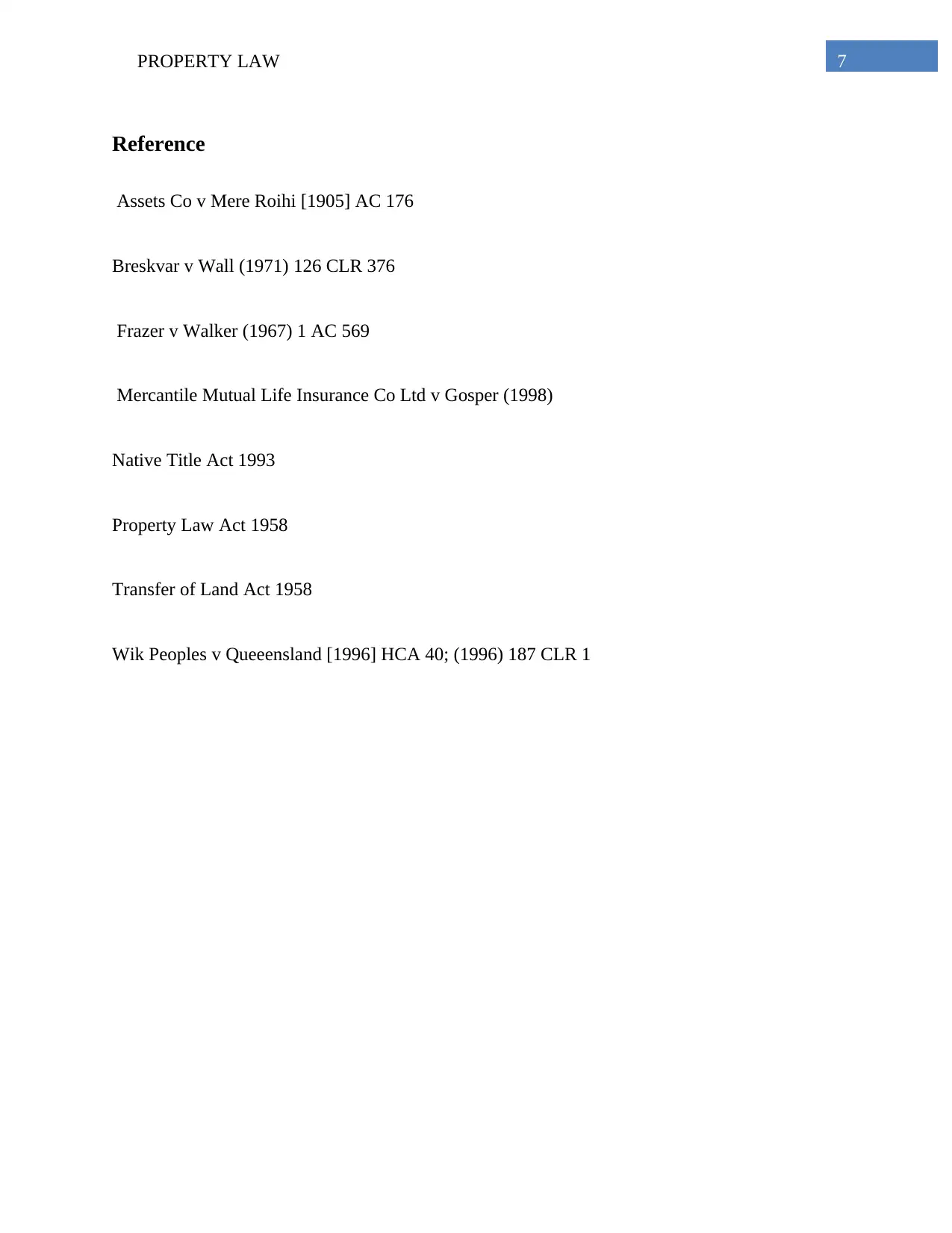
7PROPERTY LAW
Reference
Assets Co v Mere Roihi [1905] AC 176
Breskvar v Wall (1971) 126 CLR 376
Frazer v Walker (1967) 1 AC 569
Mercantile Mutual Life Insurance Co Ltd v Gosper (1998)
Native Title Act 1993
Property Law Act 1958
Transfer of Land Act 1958
Wik Peoples v Queeensland [1996] HCA 40; (1996) 187 CLR 1
Reference
Assets Co v Mere Roihi [1905] AC 176
Breskvar v Wall (1971) 126 CLR 376
Frazer v Walker (1967) 1 AC 569
Mercantile Mutual Life Insurance Co Ltd v Gosper (1998)
Native Title Act 1993
Property Law Act 1958
Transfer of Land Act 1958
Wik Peoples v Queeensland [1996] HCA 40; (1996) 187 CLR 1
1 out of 8
Related Documents
Your All-in-One AI-Powered Toolkit for Academic Success.
+13062052269
info@desklib.com
Available 24*7 on WhatsApp / Email
![[object Object]](/_next/static/media/star-bottom.7253800d.svg)
Unlock your academic potential
Copyright © 2020–2026 A2Z Services. All Rights Reserved. Developed and managed by ZUCOL.





